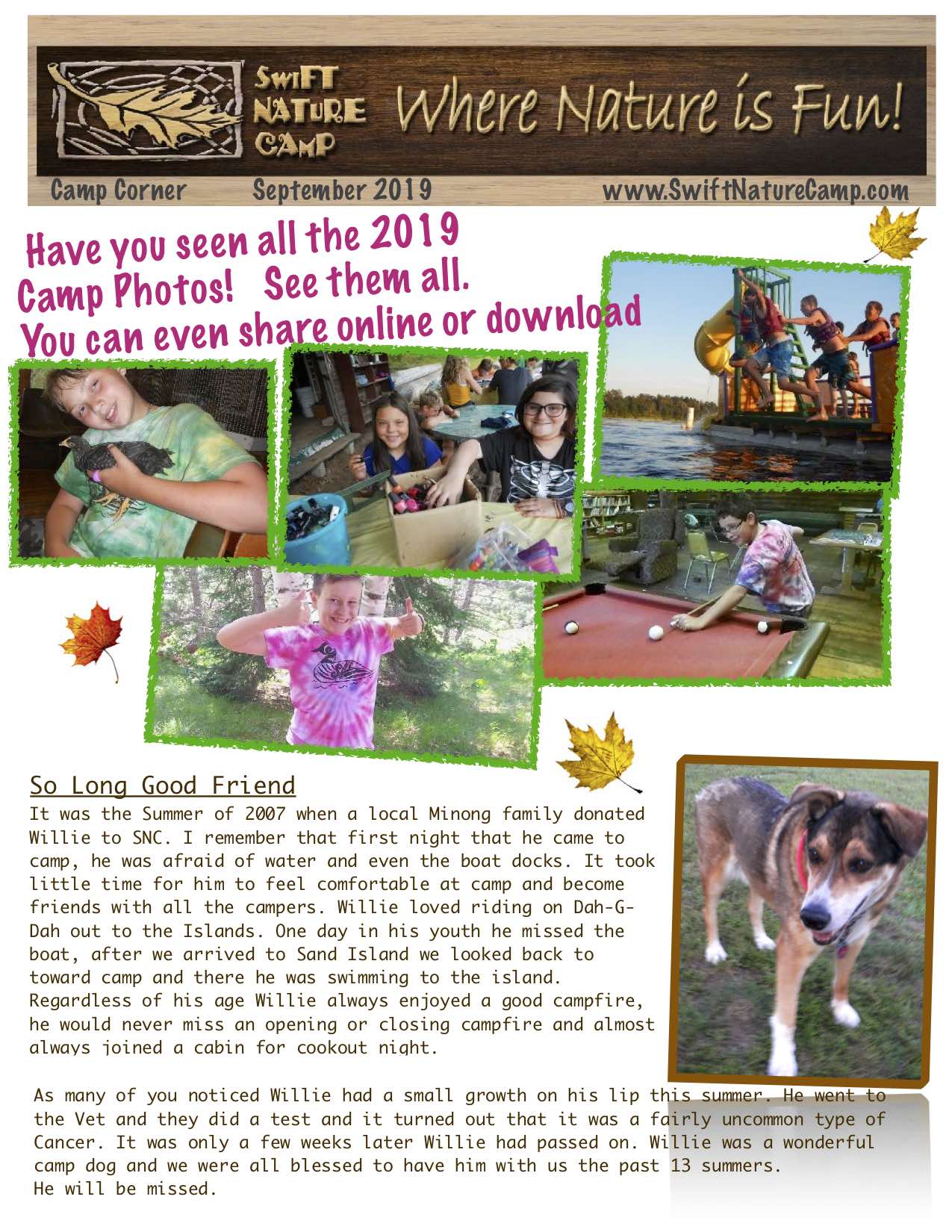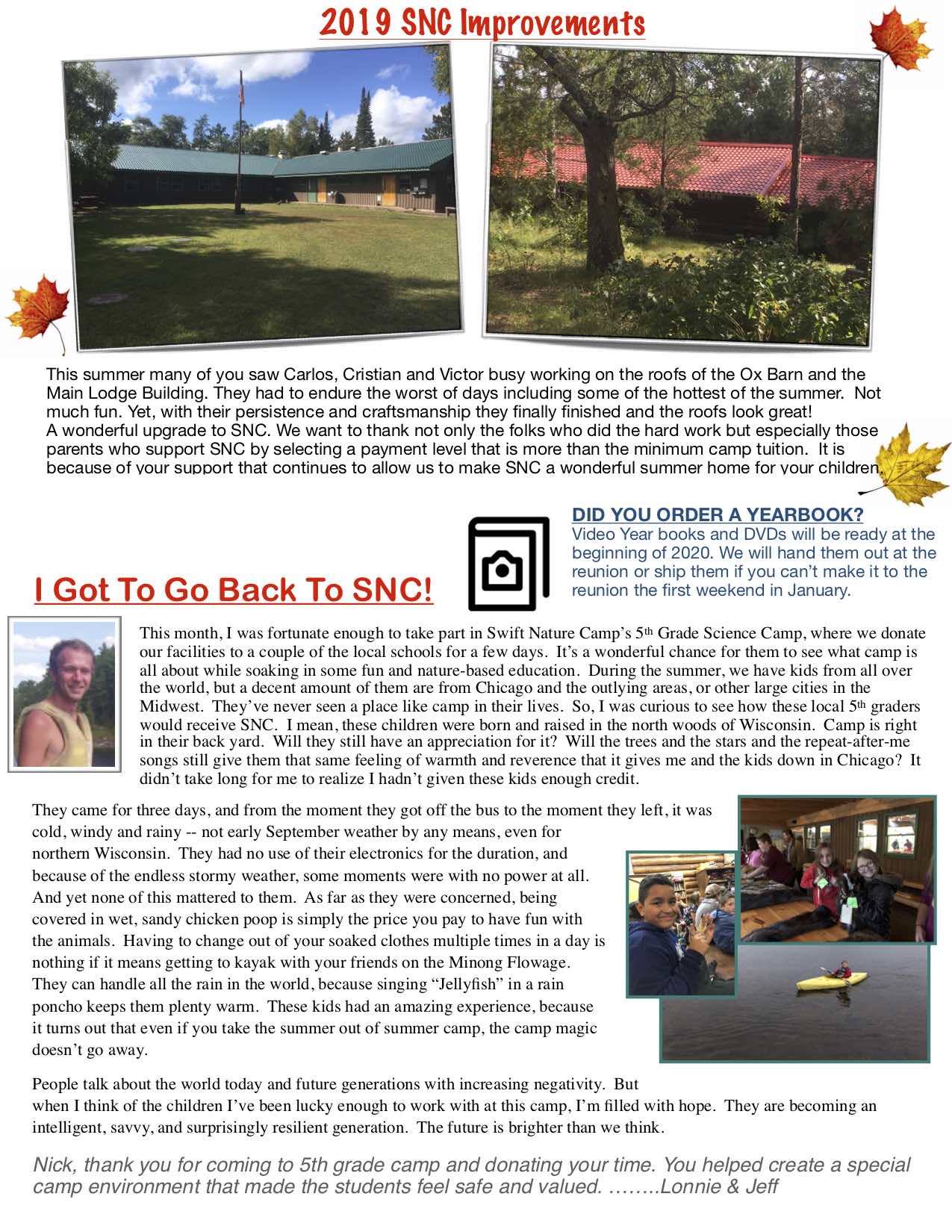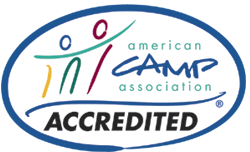Why Homeschooling and Summer Camps Go Hand-in-Hand
Homeschooling has rapidly evolved over the years. Thanks to a combination of proactive, community-minded parents and modern technology, children are no longer forced to go without socialization the way previous generations of homeschoolers were. From different public and private homeschooling networks, to video chats with teachers and fellow students, homeschooled children are more connected to the world around them than ever. Still, the idea of sending a child from a homeschool environment to an overnight camp for the first time can make some families unsure. But combining the benefits of homeschooling with the right summer camp can work wonders for a kid.
The beauty of the homeschool summer camp collaboration is that there is a good chance camp reflects the same values projected at home. There are countless reasons parents choose to homeschool their childr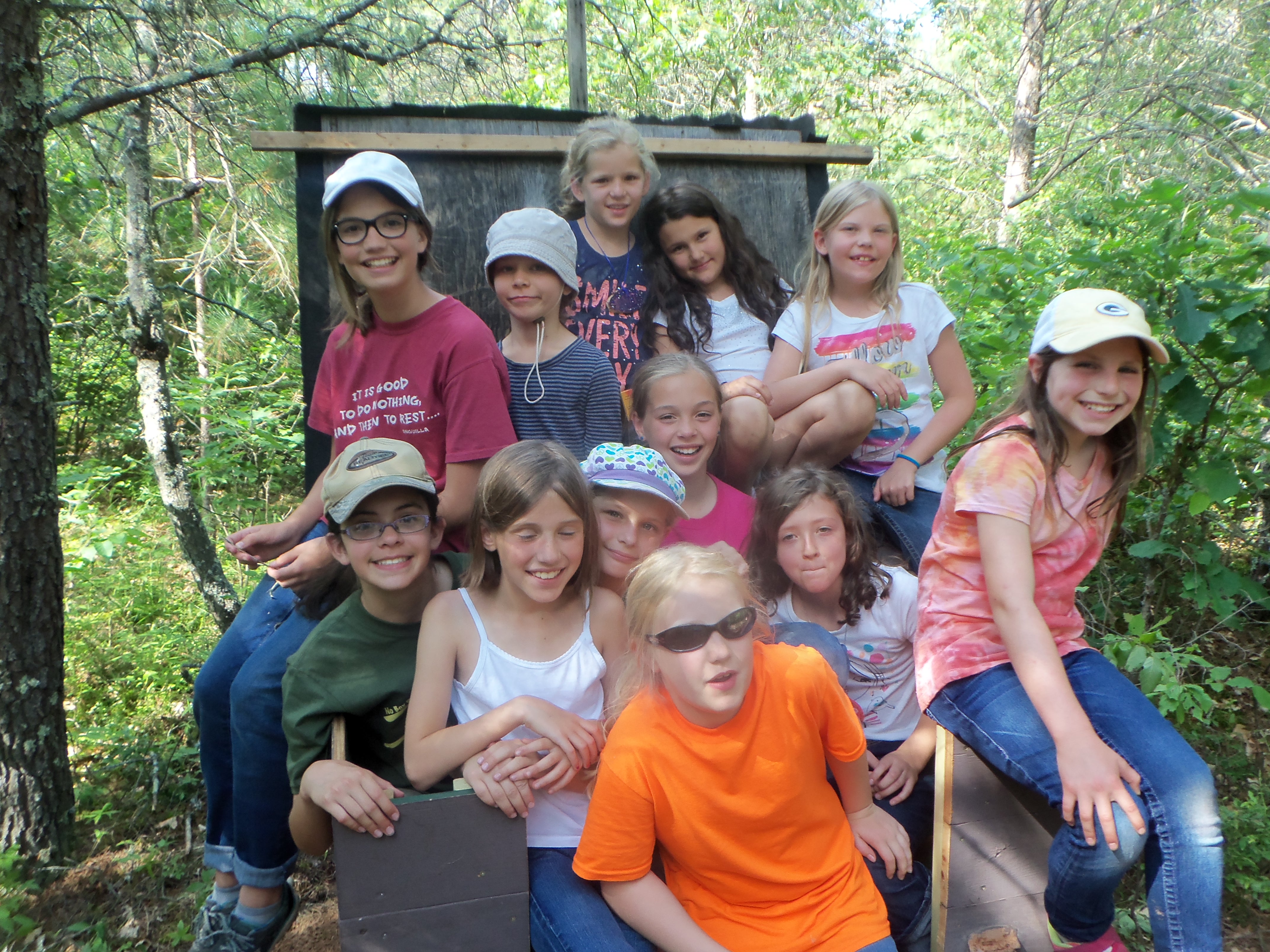
Being in a cabin at Swift Nature Camp can be especially beneficial to a child from a home-school background because it goes beyond basic socialization and builds a sense of comradery unlike any other. It is the perfect place to learn the true value of a community and develop a healthy respect for everyone in it. Perhaps the most under-appreciated aspect of summer camp is that it provides an environment in which traits and characteristics of future leaders can blossom. There are few things more gratifying in this line of work than watching a kid emerge as a leader amongst their peers.
Attending a residential summer camp can have benefits for home-schoolers years down the road, as well. The ability to adapt to a new environment and be comfortable way from home is an underrated skill. Young adults are routinely sent off to college without ever having been away from family for extended periods and can find it surprisingly difficult to cope. A study published on hap.org revealed nearly 70% of first year college students report sever homesickness to the point where it affected their coursework. A sleepaway camp is an ideal way to hone this skill and better prepare them for the future.
The right summer camp is beneficial for any child, but when a child comes from a homeschool environment they have an ever greater chance to thrive at overnight summer camp. Plus with SNC only 2 hours from Minneapolis /St. Paul Minnesota it is easy for parents to have a visit and see all the personal growth and fun their campers are having.
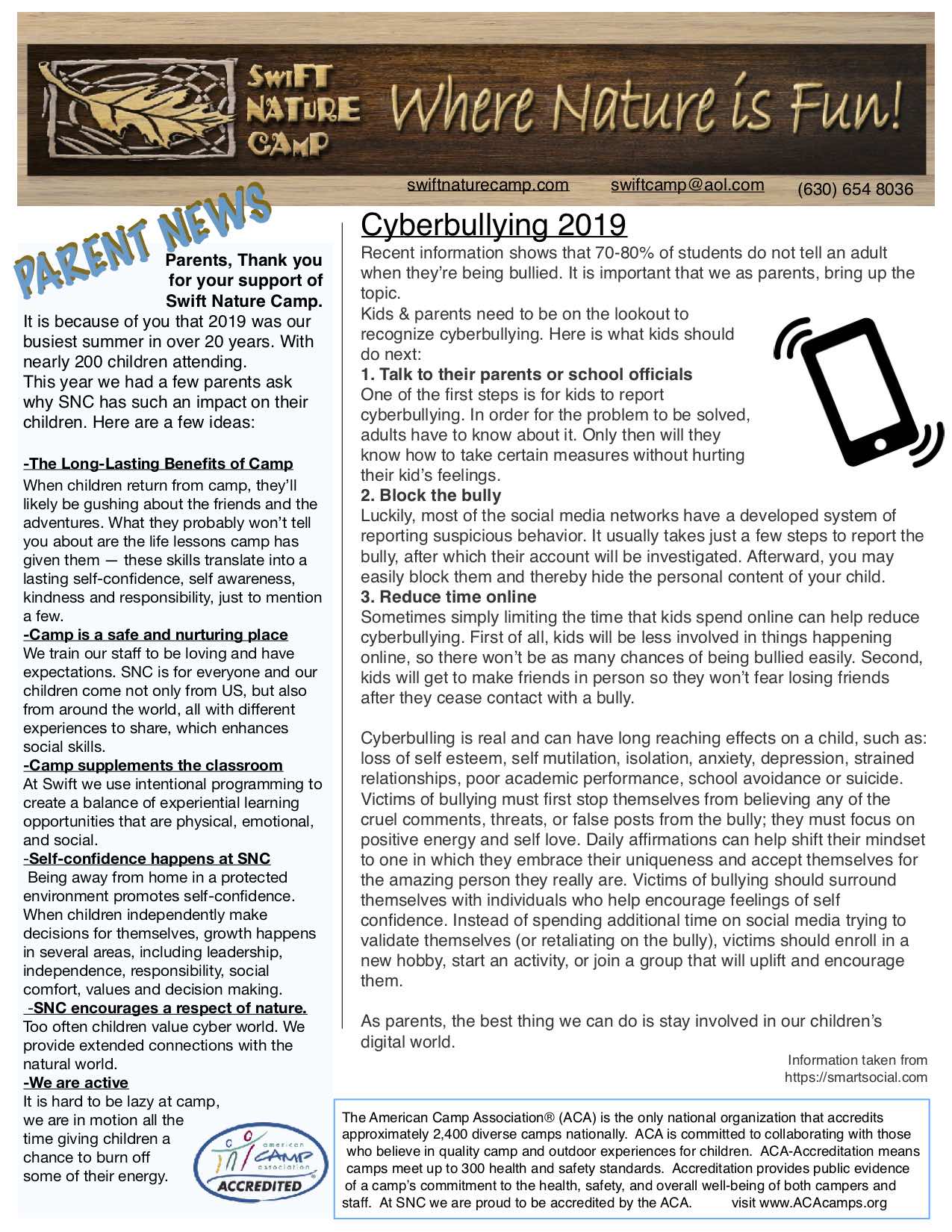
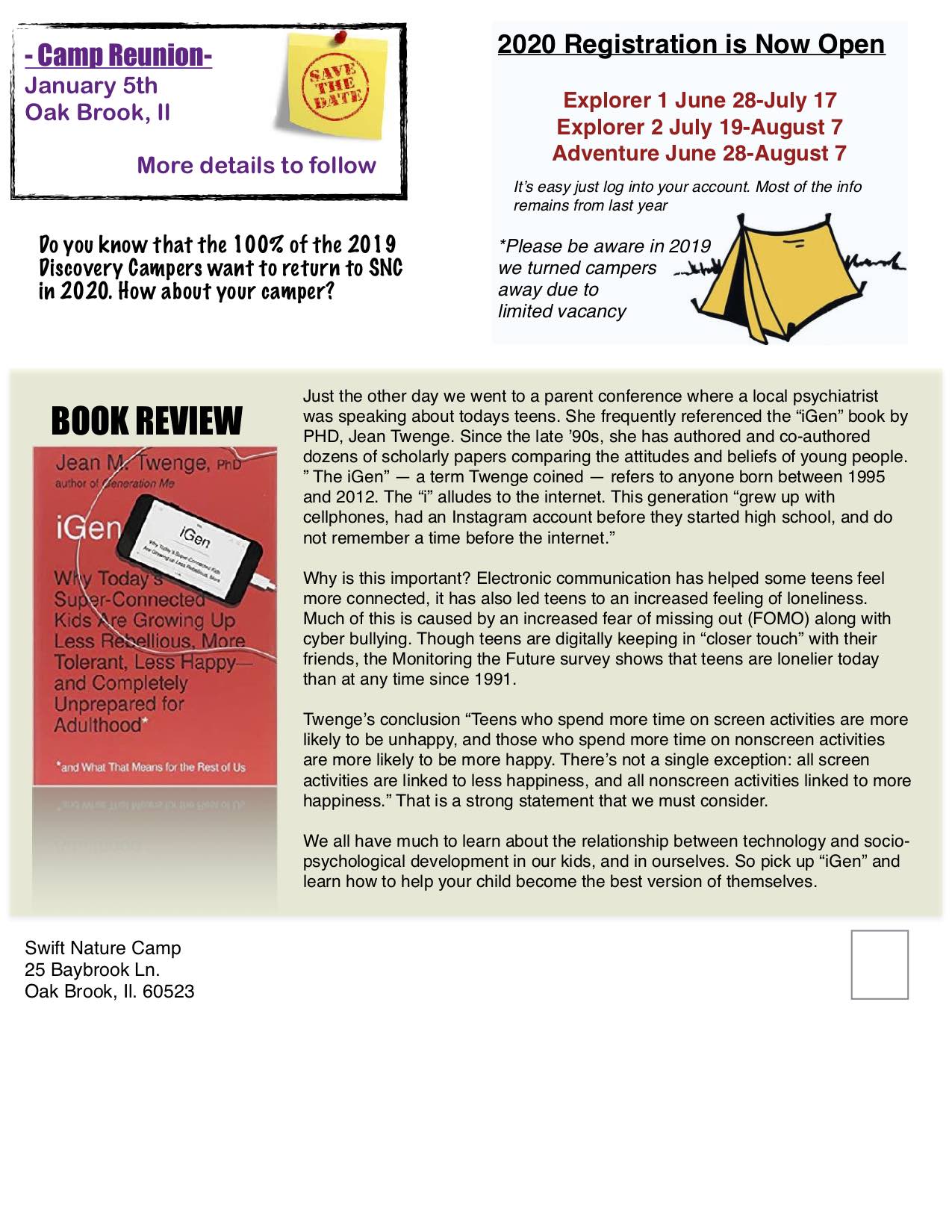
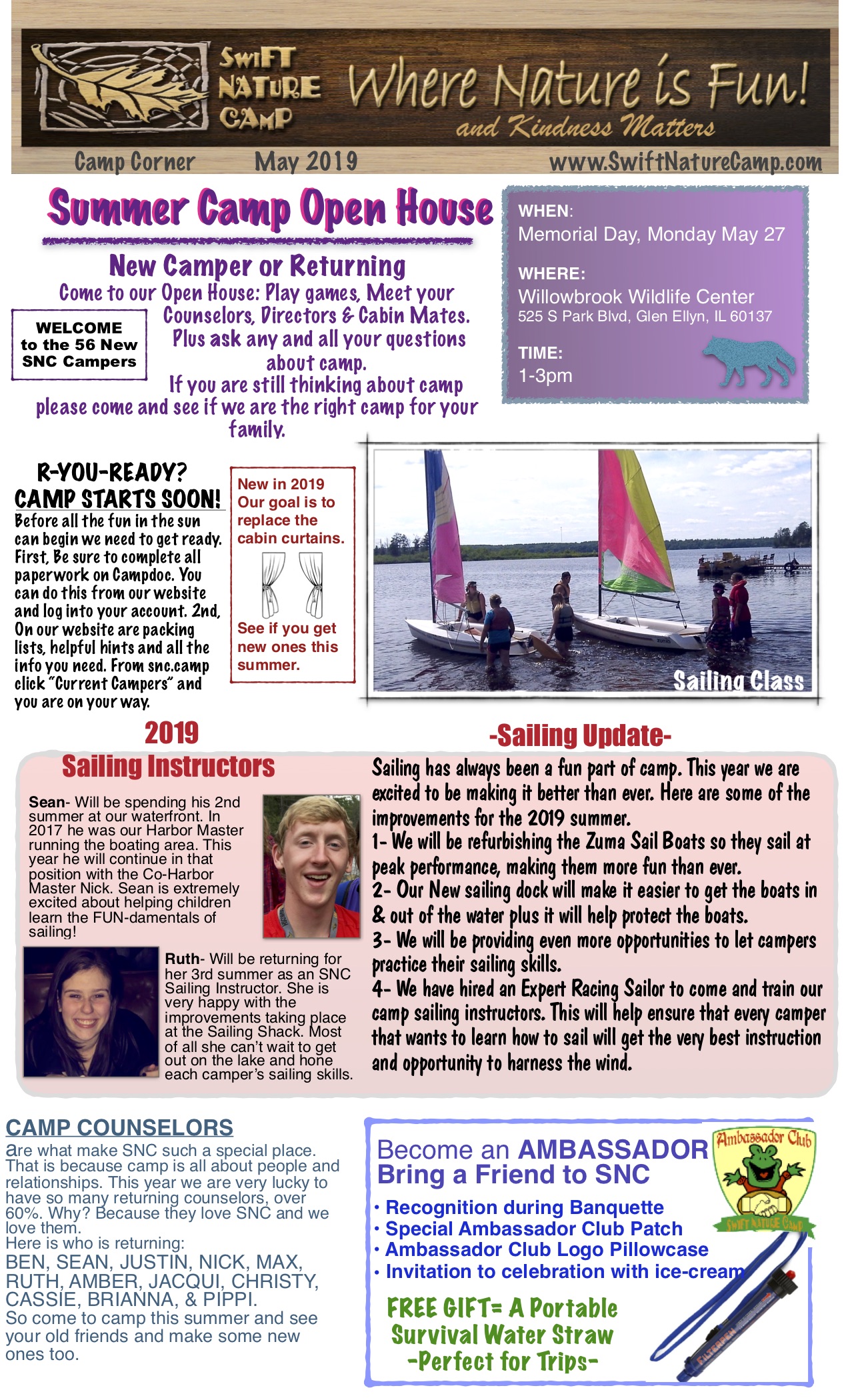
Learn More About Overnight Summer Camp
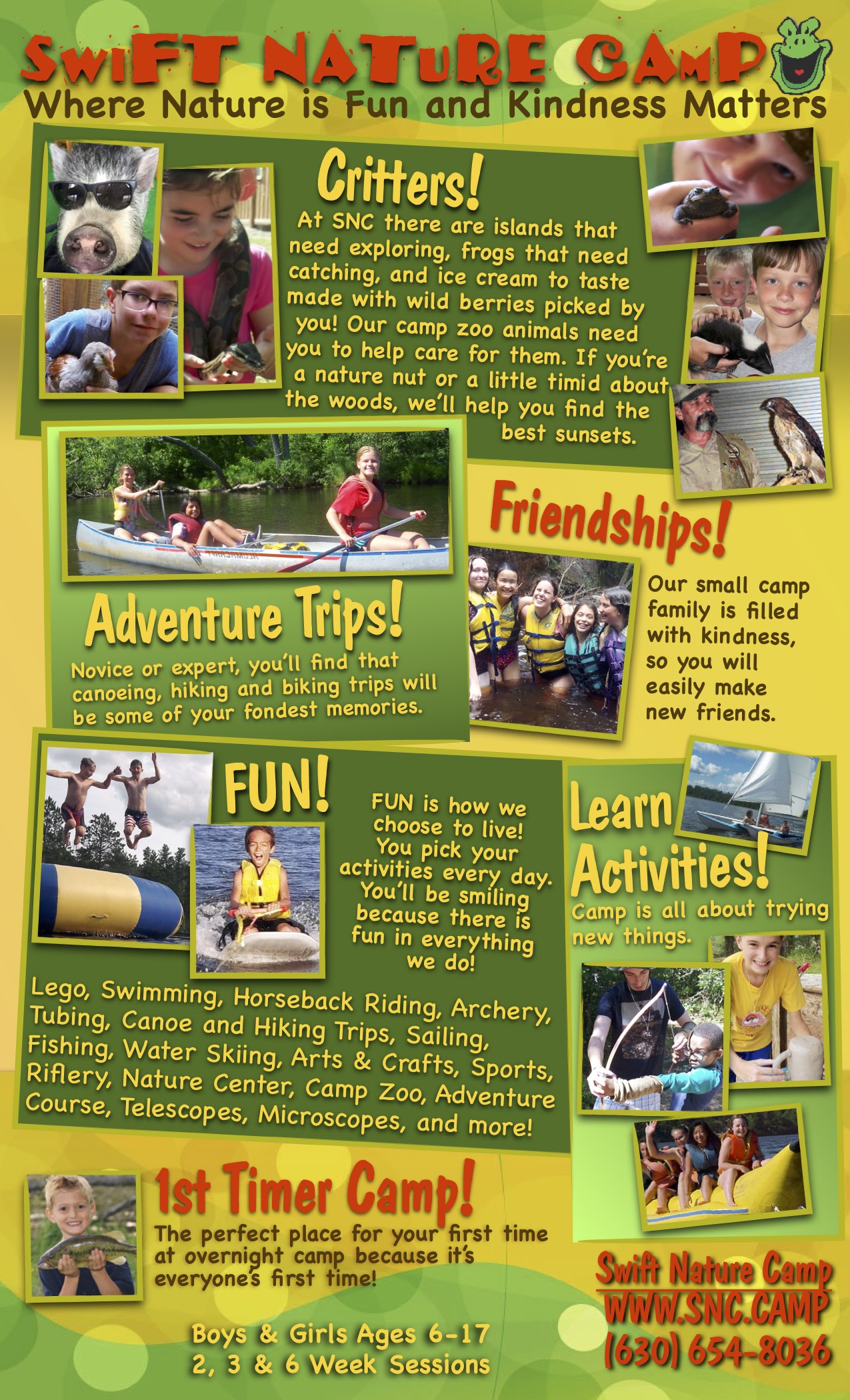
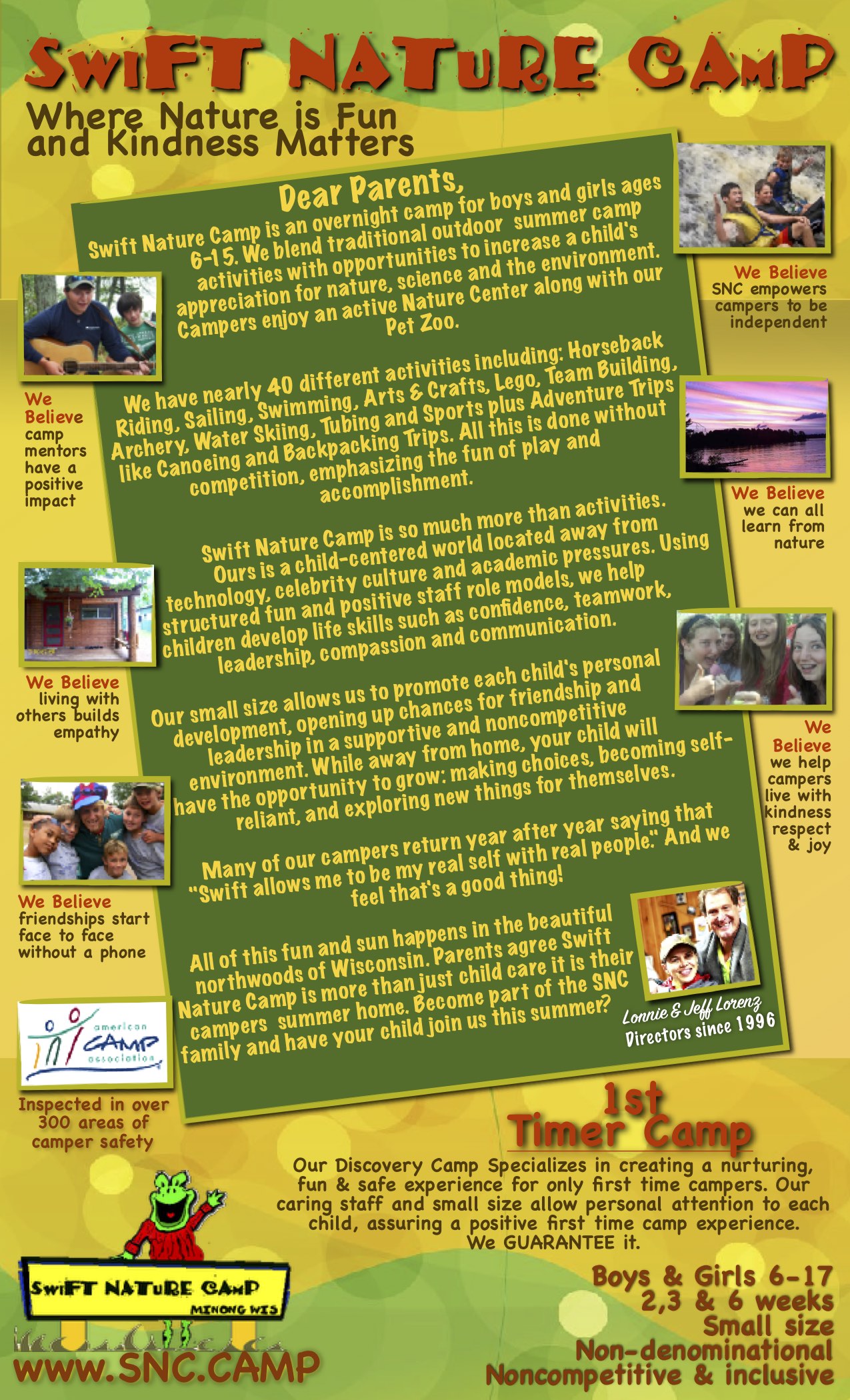

Come to the Swift Nature Camp
Informational Open House
in Chicagoland May 27th - MEMORIAL DAY.
Our Open House is a wonderful time to learn more about camp by meeting the Directors (Lonnie & Jeff), staff and other campers. If you are already enrolled in camp this is a wonderful time to meet new friends and play games with the other campers and counselors. You can even bring a friend. We will take a hike round Willowbrook Wildlife Center and explore the animals and activities. If you have not committed to SNC and are still thinking we might be the right camp for you, please come with your questions. We hope you can make it to this fun program. Please dress for the weather. If you have any questions call us at 630-654-8036.
We hope to see you there, Lonnie & Jeff
OPEN HOUSE AT THE WILLOWBROOK WILDLIFE CENTER
Why Come? Have your questions answered, Feel more comfortable with the owners and staff, Make firends, Help campers feel good cabout camp
Camper Games and Hike-START TIME: 1pm
Parent Information -START TIME: 1pm
Camper & Parent Question & Answers: 2pm
Ending 3pm
WHERE: Willowbrook Wildlife Center (across from the College of DuPage) Glen Ellyn Il
WHO: Campers Enrolled or Families that are considering SNC and want more information
DIRECTIONS to Willowbrook Wildlife, Center Glen Ellyn, Il
WILLOWBROOK WILDLIFE CENTER IS LOCATED on the east side of Park Boulevard across from College of DuPage, one mile south of Roosevelt (Rt. 38) and one mile north of Butterfield Road (Rt. 56). ph(630) 942-6200
525 S Park Blvd, Glen Ellyn, IL 60137
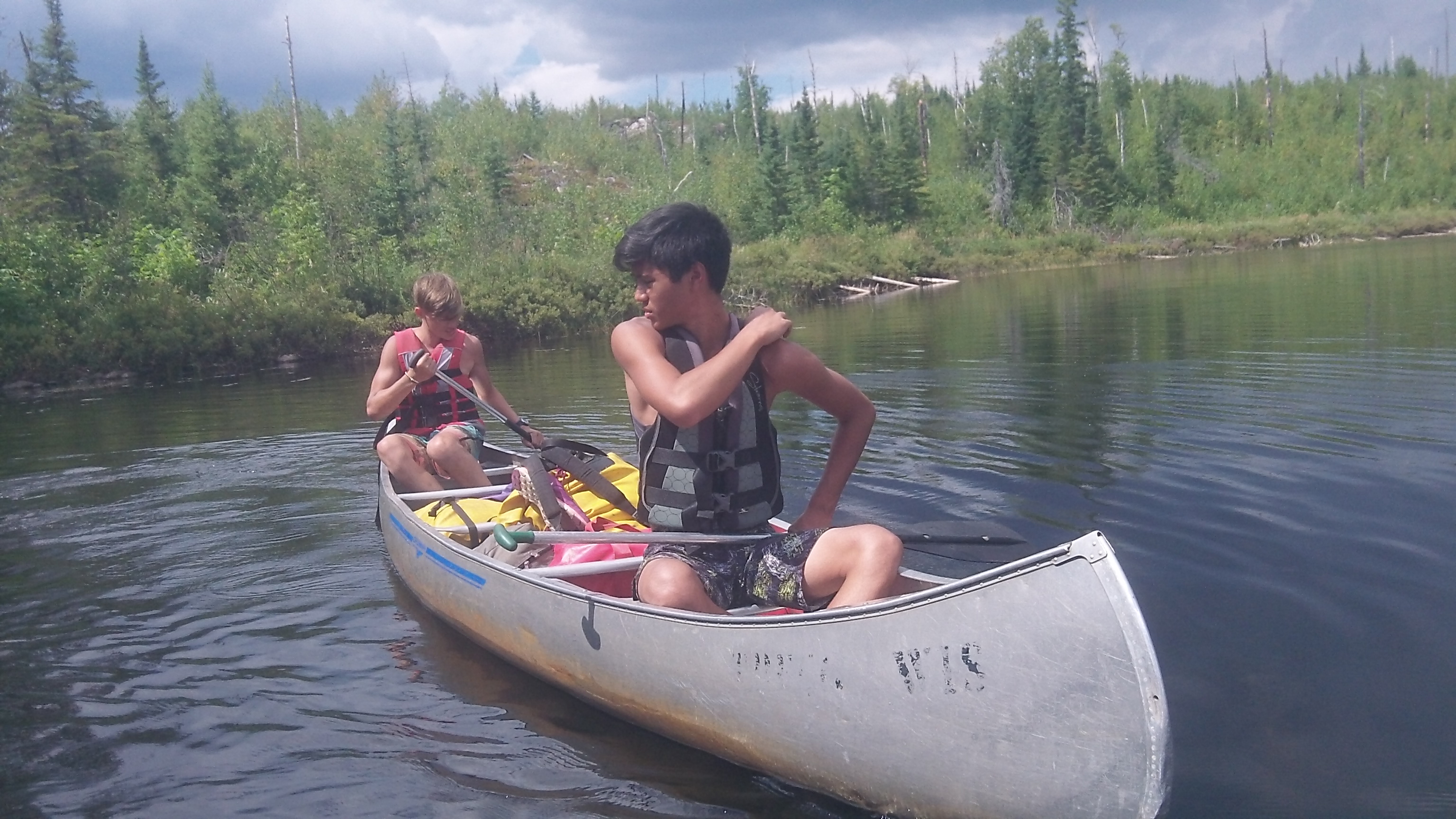
Here are 3 Must Do's before you send your child off to the Northwoods of Minnesota:
1) Scour The Website
Every camp has a website. Yet, not all websites are created the same, be sure to look past the smiling campers faces. What is the feel of the site? Was it created by a camp director or was it built by a professional company that puts all the latest bells and whistles on the site to impress you and your child. Next, does the site have the information? Read, read, read, This day and age we all want to do things fast and get them done, but remember, you are sending your most important asset out alone to an overnight summer camp in Minnesota. For instance, at Swift Nature Camp they have a parent section with a section "Policies that Protect Campers" . Having a section like this helps show that they are dedicated to child safety, even the things that are so bad nobody want to talk about them. Remember this, any summer camp can create a website, and all websites are advertising, they are not going to tell you the bad stuff that happened at camp last year, so it is important to know who stands behind the site and the summer camp you are sending your child off too.
2) Talk To The Camp Director
Every camp has a leader. This position sets the tone for staff development, camper and parent interactions and camp safety. For many camps this is a part time position and often given to a person who is still in their 20's with little experience. I once called a camp in Minnesota and they told me that I could not speak to a camp director because they don't do that. When I inquired why, they mentioned they did not have an overnight summer camp Director yet. By calling the camp directors you have the opportunity to ask questions about the philosophy and feel of the camp. Do you feel the Director understands children and knows how to manage a staff of 18-22 year old staff members. The camp director is the most important person at your summer camp be sure you chat with them and have your questions ready in advance. SummerCampAdvice has a worksheet to help pick the right camp .
3) Ask For References
References are the key to knowing that the overnight summer camp you pick is the right one for your child. As parents, talking to references will help give you some insight into what another parent thinks about the camp. The best way to do this is call the camp director and ask for at least 3 references. This will help prove that the camp has relationships with its families and is not just processing children through its program. Questions to ask the parents might include: Was your child homesick? What did the camp do to help? or Why did you select this camp? Don't forget that talking to references can be children as well. So talking to the camper has great insight. Some questions might include: What was your happiest time? Why? Did you ever feel scared? Your child might even put together a few questions they feel are important and then they can ask them of the camper. Talking is important dont text, dialog is important and the tone of the conversation can give you even more information. Remember this is a fact gathering task so be open
Overnight summer camps in Minnesota have a very good safety record, better than public schools in Minnesota. As parents, we want more than our kids being safe at camp. We want our child to benefit from all that camp provides. We know that summer camp provides a place for kids to learn to swim, sleep in a cabin and sing around a campfire, they can be rewarded with personal development skills that can help them in the classroom, in their relationships and in whatever calling they choose. At our camp we often talk about the Magic of summer camp and when I ask campers and staff what this means the answer that I most often get is "Swift Nature Camp creates a place where I am my BEST Self" and isn't that the best thing we as parents want for our children summer camp experience?
Swift Nature Camp is an overnight nature camp for boys and girls ages 6-15. Our focus is to blend traditional summer camp activities while increasing a child's appreciation for nature, science and the environment. Swift Nature Camp offers traditional summer camp activities along with an environmental focus. Campers enjoy an active Nature Center, Pet Zoo, and Department of Natural Resources sponsored programs, plus recreational activities that include canoe and backpack trips, horseback riding, swimming, arts & crafts, team courses, archery, sailing, water skiing, tubing and sports.
Our special Discovery Camp is a nurturing program for first-time overnight campers, offering additional staff to provide support and encouragement to overcome homesickness and build confidence. The program welcomes no more than 50 first-time campers, and the special attention that this intimate group receives is the reason that more than 92% of them wish to return.
 Jestem dyrektorem obozu letniego dla dzieci i młodzieży ale przede wszystkim jestem rodzicem. Obserwując zjawisko spędzania wielu godzin przez nasze dzieci przed ekranem komputera lub telewizora ogarnia mnie przerażenie. Co się stało, że najmłodsi zamienili zabawę na świeżym powietrzu na długotrwałe przesiadywanie w zamkniętym pomieszczeniu przez elektronicznym urządzeniem? Jeszcze nie tak dawno, pamiętamy to ze swojego dzieciństwa, kiedy dzieci miały wolny czas, beztrosko bawiły się z rówieśnikami, czytały książki, goniły po podwórku i sąsiedztwie. Dziś wybierają ekran komputera, tabletu czy telefonu. To nowy styl życia, który przejęła nie tylko młodzież. Dochodzi do takich paradoksów kiedy rodzice karząc dziecko zobowiązują go by wyszło z domu. Dla nas karą było gdy rodzice zabronili nam wyjść do kolegów na podwórko. Często my dorośli nie tylko nie sprzeciwiamy się takim sytuacjom ale sami promujemy taka formę wypoczynku. Być może czasem zwrócimy naszym dzieciom uwagę by odłożyły komputer, czy telefon ale tak naprawdę nie wiele to daje. To od nas, jako rodziców, zależy czy dzieci zachowają zdrowe proporcje bycia " na internecie" i " poza internetem".
Jestem dyrektorem obozu letniego dla dzieci i młodzieży ale przede wszystkim jestem rodzicem. Obserwując zjawisko spędzania wielu godzin przez nasze dzieci przed ekranem komputera lub telewizora ogarnia mnie przerażenie. Co się stało, że najmłodsi zamienili zabawę na świeżym powietrzu na długotrwałe przesiadywanie w zamkniętym pomieszczeniu przez elektronicznym urządzeniem? Jeszcze nie tak dawno, pamiętamy to ze swojego dzieciństwa, kiedy dzieci miały wolny czas, beztrosko bawiły się z rówieśnikami, czytały książki, goniły po podwórku i sąsiedztwie. Dziś wybierają ekran komputera, tabletu czy telefonu. To nowy styl życia, który przejęła nie tylko młodzież. Dochodzi do takich paradoksów kiedy rodzice karząc dziecko zobowiązują go by wyszło z domu. Dla nas karą było gdy rodzice zabronili nam wyjść do kolegów na podwórko. Często my dorośli nie tylko nie sprzeciwiamy się takim sytuacjom ale sami promujemy taka formę wypoczynku. Być może czasem zwrócimy naszym dzieciom uwagę by odłożyły komputer, czy telefon ale tak naprawdę nie wiele to daje. To od nas, jako rodziców, zależy czy dzieci zachowają zdrowe proporcje bycia " na internecie" i " poza internetem".
Ile czasu twoje dziecko spędza przed ekranem? Dwie godziny, trzy, pięć...? Ostanie badania naukowe wykazały, że dzieci i młodzież w wieku 8-18 lat spędzają przeciętnie 7.5 godziny dziennie przed ekranem. Co w tym takiego złego? Efektem takiego stylu życia sa problemy z koncentracja uwagi, problemy wychowawcze, trudności w nauce, w zasypianiu, otyłość czy powolny zanik tradycyjnych relacji międzyludzkich. Lekarze opisują nową etiologię nadciśnienia tętniczego u nastolatków, która wynika z wielogodzinnych sesji “online” spędzonych na grach komputerowych. Młodym ludziom coraz trudniej nawiązywać kontakty " twarzą w twarz". Ekran to rozrywka i często dla tzw. świetego spokoju pozwalamy dzieciom na taka formę zabawy. Przyjrzyjmy sie sytuacjom codziennym np. w restauracji. Nie rzadko siedząca przy stole rodzina podzielona jest na tych, którzy rozmawiają patrząc sobie w oczy( to zwykle starsze osoby) i tych, którzy wpatrzeni sa w ekran telefonu i nie sa zaangażowani w rodzinna rozmowę. Jeśli chcemy zmiany, wszyscy musimy podjąć w tym celu odpowiedni wysiłek.
Zarówno my rodzice jak i dzieci powinniśmy ograniczyć czas spędzany przed ekranem. Nie możemy mieć wymówki, ze był ciężki dzień w pracy dlatego siadamy przed telewizorem i sie relaksujemy. Jako rodzina usiądźmy razem i porozmawiajmy o tym nowym stylu życia.
1) Ustalmy reguły według których wiadomo będzie ile czasu przed ekranem jest dopuszczalne.
W naszym domu jest to przywilej, nagroda za odrobione lekcje i wykonanie innych obowiązków.
2) Tak jak jest zakaz prowadzenia pojazdów i tekstowania, wprowadźmy podobne zasady w domu. Np. Zakaz tekstowania przy stole w czasie posiłku, czy po określonej godzinie.
3) Dzieci często uciekają sie do ekranu bo nie wiedza co z sobą zrobić. Zachęćmy je do zabaw z naszego dzieciństwa, niech pogonią po podwórku, łapią żaby, robią łuki z patyków a jak zimno na zewnątrz niech budują z LEGO, rysują, układają puzzle. A jak jest możliwość to i my zaangażujmy sie w rodzinny spacer, czy wycieczkę rowerową.
W naszym domu tradycją stał sie wieczór gier planszowych, na które często wparszaja sie znajomi. Czas spędzony przed ekranem jest ograniczony do 30 minut po wykonanych obowiązkach. Raz w tygodniu mamy wieczor kiedy zasiadamy jako rodzina i oglądamy film odpowiedni dla nas wszystkich. Czy taki styl życia jest łatwy? Zdecydowanie nie, to nasz wybór. Ale za to możemy więcej czasu spędzić razem i wcale to nie jest takie złe :)
Niech to będzie wyzwanie dla całej rodziny. Walczmy z tym technologicznym potworem i nie dajmy sie mu pożreć. Postęp technologiczny jest wspaniały i ważne jest by dzieci potrafiły z niego korzystać, jednak nie pozwalajmy by przez to zanikały międzyludzkie relacje czy tradycyjne wartości.
Pozdrawiam serdecznie,
Jola Lorenz
Wlasciciel obozu Swift Nature Camp
www.SwiftNatureCamp.com
Summer Camp is Expensive
As parents we often make decisions that are hard. Yet, we know these decisions are the best for our children. Summer Camp is no exception. We know deep down that camp will help our Childs independence, empathy and team building skills Yet, camp is expensive. So you want to save money on summer camp? Who doesn't! The best way to save money on Summer camp is to start looking as soon as possible. Here is a quick list of just a few of the ways to save on your Childs overnight camp experience.
1. Summer Camp Special Offer
Many camps may have special offers. It will take research to find them. Some camps will even reduce prices if they need to fill beds at a particular session. So having flexibility in dates and talking with the camp director you may be able to save. Right now Swift Nature Camp is having A First timer Summer Camp special offer saving nearly 30% off the session price.
Many camps have camper ships that allow families in need to reduce the price of camp. At Swift Nature Camp we believe that every child should go to camp so we offer financial assistance programs. We look for donations plus we match our donations but these are on a first-come, first-served basis so funds do run out.
Yes, Even if you don't qualify for scholarships or other discounts, you may be able to pay for day camp for kids under 13 using pre-tax dollars in a dependent care flexible spending arrangement (FSA). The IRS caps dependent care FSAs at $5,000 per year, and your employer withholds money from each paycheck to fund the plan.Also consider the Child and Dependent Care Credit, which allows taxpayers to deduct up to 35 percent of their childcare expenses, up to a maximum of $6,000. The best advice is to check with a tax planning professional and keep track of expenses and check the latest tax code.
4. Register Early.
Many summer programs reward the early bird. So shop in the fall for the upcoming summer. Before registering ask if the camp provides any early bird pricing. You will be surprised.
“The memories of camp far outlast the price of camp”. This saying is very true children that attend camp will have positive memories for a lifetime. Yes, prices should play an important role in your decision, but it should not the only factor when selecting where to send your child.
Parents need to realize that a quality overnight summer camp is so much more than just daycare. An intentional camp wit provide your child with: responsibility, compassion, cooperation, trying new things and independence just to name a few. The American Camp Associations have been doing studies for years that show the positive effects of summer camp.
In a recent article "Five Childhood Experiences That Lead to a More Purposeful Life"it was suggested that children that experience conflict and adversity in a positive setting can ultimately create more purposeful life. When we send our children off to camp it can be hard for many children and yet that experience is good for them. As parents we often need to think past today and what the long term impact for our child might be. The right camp will have a positive effect.
To learn more about picking the right summer camp see SumerCampAdvice.com
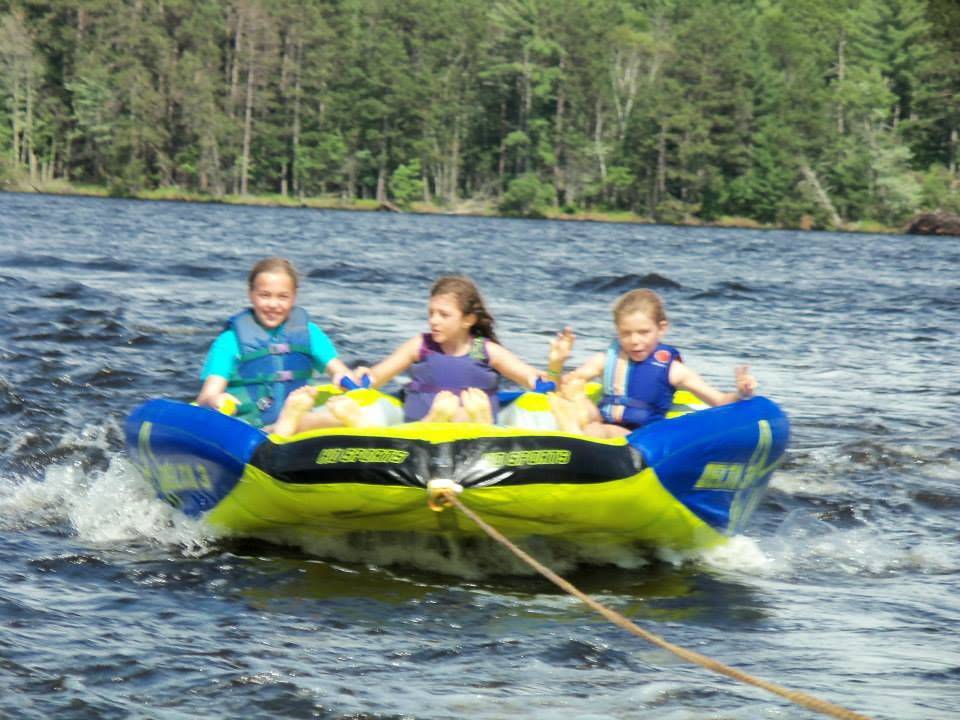
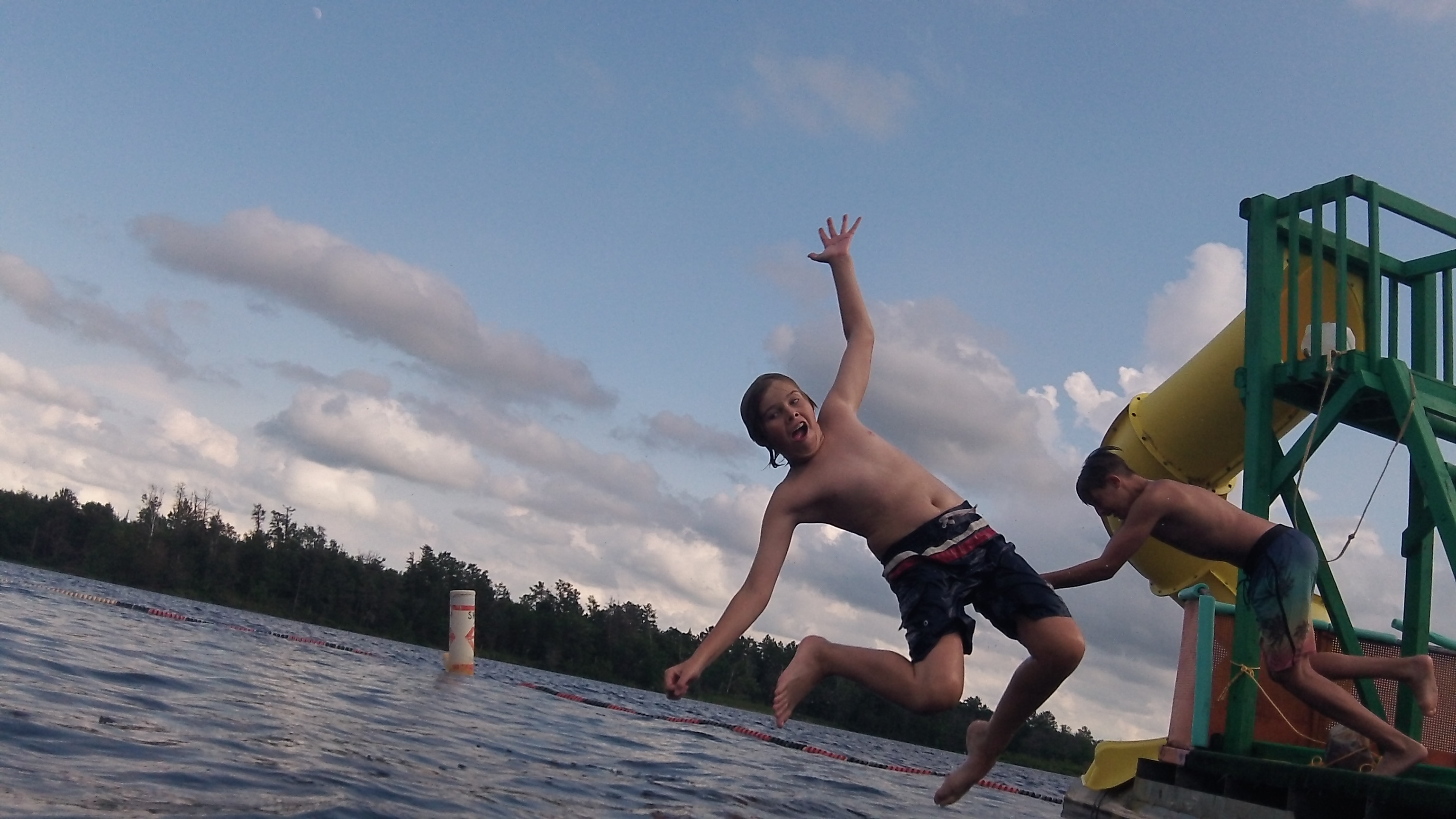
Here are a just a few of the more important questions:
- How long are the sessions?
- How are staff trained?
- Is an RN or Doctor on staff?
- Are activities going to be enjoyed by your child?
- Coed or single gender?
- How many children, How many staff?
- Are cell phones allowed?
- What is the cost?
- Is the camp Accredited by the American Camp Association?
To find a detailed list of questions to answer please see Summer Camp Advice.
The above list is only a beginning of question needed. So you can see that when you get to the point of thinking about location many other areas of concern should have already been addressed. Parents need to realize they need to trust the camp and its directors in order to achieve some of the benefit of an overnight camp. This is why it is important for parent to contact the directors and create a personal relationship with the camp.
- Here are a few Reasons to choose a camp farther from home:
It's worth it: There may be something about a camp that makes the travel worth it. If your child wants to specialize in sailing or mountain climbing, you'll need to choose a camp that meets those need. A parent may have a preference for a camp that they once attended, even if they no longer reside in the area. -
Diversity: While your camper may not see as many familiar faces in a camp far from home, this may be just what he or she, and you, want. Children may want to separate their camp life from the lives they lead the rest of the year, having the opportunity to begin the program with a 'clean slate'. Campers often have a sense of freedom when they go to a camp where they don't know anyone.
-
The distance doesn't bother the camper or parents: Many children find traveling alone, even by airplane, exciting rather than scary. Assuming that proper travel arrangements are made, you may be comfortable with a camp away from home.
- So when picking a sleep away summer camp do your homework. Realize that many many considerations need to be made and and be aware that overnight camps near me should not be your first search term. Using this, you will limit your options and minimize many of the benefits summer camp can provide.
Jeff and Lonnie Lorenz, directors of Wisconsin’s Swift Nature Camp for twenty five years, believe summer camp is a unique opportunity for dimensional childcare at the best value. A sleep away summer camp experience will benefit each child by creating memories, try new things, gain skills and independence and make new and lifelong friends. Summer camp is more than child care it is an opportunity for personal growth. The First Time Camper program is the perfect place to start on an overnight summer camp adventure.




